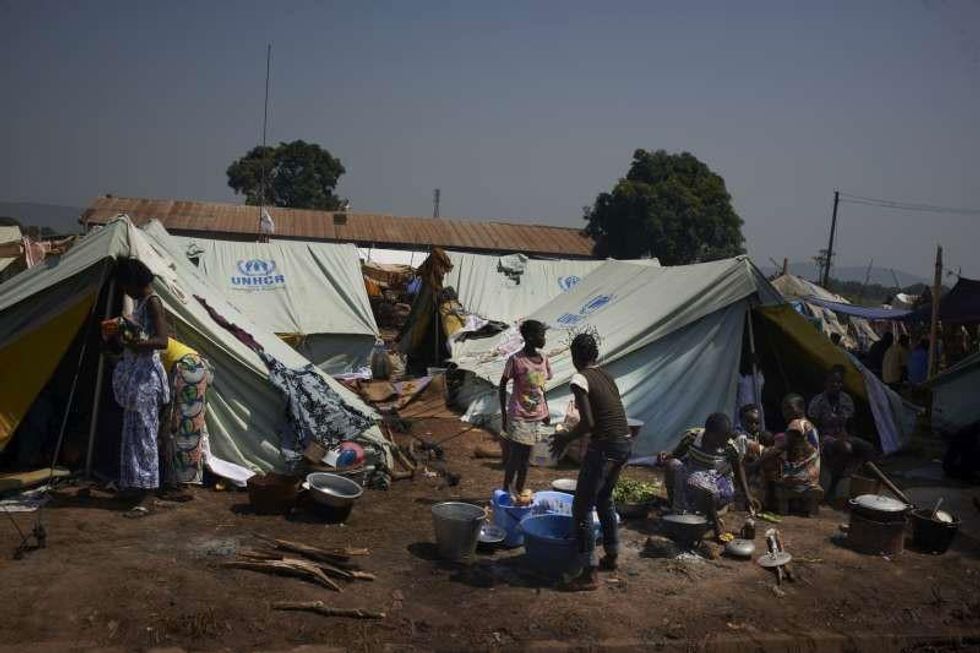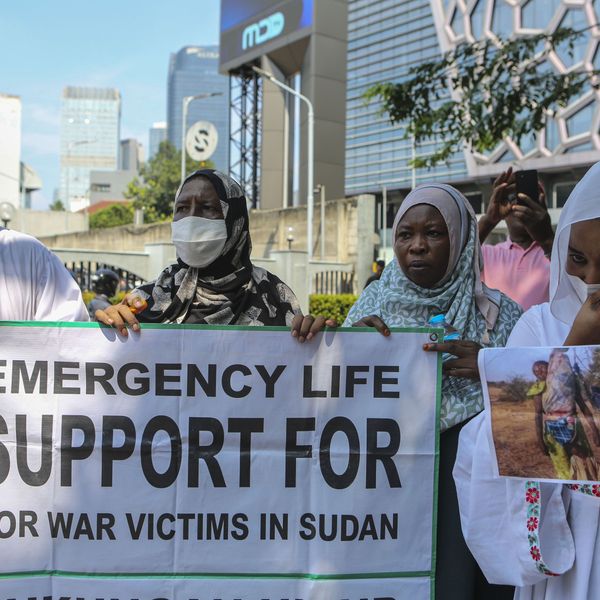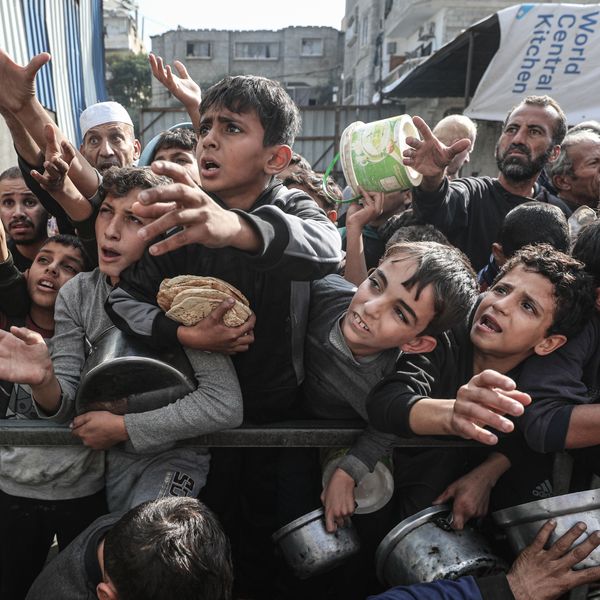Doctors Without Borders Slams UN for Humanitarian Fail
UN suspends aid stranding tens of thousands of displaced people amidst spiraling crisis in Central African Republic

"The only actions undertaken by UN aid officials have been the collection of data related to the fighting and a few assessments confirming the need for an immediate response," wrote MSF International President Dr. Joanne Liu. "Repeated evaluations in the face of glaring needs [...] have not led to any concrete action."
The UN estimates that more than 710,000 people have been uprooted since the crisis began following a coup in late March. In the embattled capital of Bangui, some 210,000 have been "forcibly displaced" in the last two weeks alone.
Liu goes on to detail two specific situations in which the UN failed to provide any humanitarian relief, forcing MSF workers to intervene: One in the vicinity of the Bangui airport, where the UN abandoned more than 15,000 displaced people despite repeated calls for "food, tents and soap;" the second, in Bossangoa, when UN workers on security lockdown failed to provide assistance to displaced people sheltering inside the very same compound as they were.
"Following the fighting in Bossangoa," Liu wrote, "the UN remained on security lock-down for days, abandoning the more than 30,000 displaced persons in the main Bossangoa camps, while MSF and ACF teams move through the city to provide emergency assistance."
Describing the increasingly dire situation in the Bossangoa camp, the letter notes there are no showers, one latrine for every 166 people and only 7.8 liters of water per person each day. "Desperate civilians have not been provided with even the minimum standards required in such emergency settings."
The MSF goes on to criticize what they call are the "perception gaps" in security, saying the MSF "considers current UN security concerns disproportionate to field realities."
The letter continues:
To compound an already dismal situation, there appear to be serious perception gaps over (in)security, both among the various UN agencies and between MSF field workers and UN officials, the latter unwilling to share the rationale behind their extremely risk-averse analyses. The distorted view of the threats faced by aid agencies in the CAR, demonstrated, for example, by UN officials wearing military helmets and flak jackets in an environment that does not require such protective gear, cannot be accepted if it represents a restriction on assisting people in an extreme state of need.
[...]
Overall, such a complete disconnect from their surroundings only serves to discredit and delegitimise UN agencies and their implementing partners, jeopardising future activities and negatively impacting the protection and assistance effort to the CAR as a whole.
Following these criticisms, Adrian Edwards, spokesperson for the UN High Commissioner for Refugees (UNHCR), told reporters Tuesday that at the Bangui Airport, the UN "has had to temporarily suspend aid distribution because of security incidents, some of which are related to sectarian violence."
In a story published by the UN, they report to having called in French and African troops to "patrol" a Roman Catholic Church facility in Bossangoa where over 40,000 displaced people have sought refuge because of militia groups armed with "agricultural tools."
They write:
"We continue to hear of attacks against Christians by former Seleka, with looting, killing and houses being set on fire. As well as at the school, since September 40,000 people have found sanctuary inside Bossangoa's sprawling Roman Catholic church," the UNHCR spokesman said.
Tensions are reported at the church between members of a regional African peace-keeping force and the militia groups, who are resisting disarmament. They are armed with agricultural tools and machetes, but have refused to hand them over.
Meanwhile, UNHCR said it was extremely concerned by the presence of armed men within sites hosting displaced people. The agency has asked that French and African troops step up patrols in troubled neighborhoods and in the makeshift sites.
The UN update announces the deployment of "additional emergency teams" to CAR, though reports did not say how much.
Also Tuesday, French foreign minister Laurent Fabius confirmed that "other European countries were preparing to send troops to the Central Africa Republic," AFP reports, following the deployment of French forces earlier this month. Fabius, however, refused to name which countries.
_____________________
An Urgent Message From Our Co-Founder
Dear Common Dreams reader, The U.S. is on a fast track to authoritarianism like nothing I've ever seen. Meanwhile, corporate news outlets are utterly capitulating to Trump, twisting their coverage to avoid drawing his ire while lining up to stuff cash in his pockets. That's why I believe that Common Dreams is doing the best and most consequential reporting that we've ever done. Our small but mighty team is a progressive reporting powerhouse, covering the news every day that the corporate media never will. Our mission has always been simple: To inform. To inspire. And to ignite change for the common good. Now here's the key piece that I want all our readers to understand: None of this would be possible without your financial support. That's not just some fundraising cliche. It's the absolute and literal truth. We don't accept corporate advertising and never will. We don't have a paywall because we don't think people should be blocked from critical news based on their ability to pay. Everything we do is funded by the donations of readers like you. Will you donate now to help power the nonprofit, independent reporting of Common Dreams? Thank you for being a vital member of our community. Together, we can keep independent journalism alive when it’s needed most. - Craig Brown, Co-founder |

"The only actions undertaken by UN aid officials have been the collection of data related to the fighting and a few assessments confirming the need for an immediate response," wrote MSF International President Dr. Joanne Liu. "Repeated evaluations in the face of glaring needs [...] have not led to any concrete action."
The UN estimates that more than 710,000 people have been uprooted since the crisis began following a coup in late March. In the embattled capital of Bangui, some 210,000 have been "forcibly displaced" in the last two weeks alone.
Liu goes on to detail two specific situations in which the UN failed to provide any humanitarian relief, forcing MSF workers to intervene: One in the vicinity of the Bangui airport, where the UN abandoned more than 15,000 displaced people despite repeated calls for "food, tents and soap;" the second, in Bossangoa, when UN workers on security lockdown failed to provide assistance to displaced people sheltering inside the very same compound as they were.
"Following the fighting in Bossangoa," Liu wrote, "the UN remained on security lock-down for days, abandoning the more than 30,000 displaced persons in the main Bossangoa camps, while MSF and ACF teams move through the city to provide emergency assistance."
Describing the increasingly dire situation in the Bossangoa camp, the letter notes there are no showers, one latrine for every 166 people and only 7.8 liters of water per person each day. "Desperate civilians have not been provided with even the minimum standards required in such emergency settings."
The MSF goes on to criticize what they call are the "perception gaps" in security, saying the MSF "considers current UN security concerns disproportionate to field realities."
The letter continues:
To compound an already dismal situation, there appear to be serious perception gaps over (in)security, both among the various UN agencies and between MSF field workers and UN officials, the latter unwilling to share the rationale behind their extremely risk-averse analyses. The distorted view of the threats faced by aid agencies in the CAR, demonstrated, for example, by UN officials wearing military helmets and flak jackets in an environment that does not require such protective gear, cannot be accepted if it represents a restriction on assisting people in an extreme state of need.
[...]
Overall, such a complete disconnect from their surroundings only serves to discredit and delegitimise UN agencies and their implementing partners, jeopardising future activities and negatively impacting the protection and assistance effort to the CAR as a whole.
Following these criticisms, Adrian Edwards, spokesperson for the UN High Commissioner for Refugees (UNHCR), told reporters Tuesday that at the Bangui Airport, the UN "has had to temporarily suspend aid distribution because of security incidents, some of which are related to sectarian violence."
In a story published by the UN, they report to having called in French and African troops to "patrol" a Roman Catholic Church facility in Bossangoa where over 40,000 displaced people have sought refuge because of militia groups armed with "agricultural tools."
They write:
"We continue to hear of attacks against Christians by former Seleka, with looting, killing and houses being set on fire. As well as at the school, since September 40,000 people have found sanctuary inside Bossangoa's sprawling Roman Catholic church," the UNHCR spokesman said.
Tensions are reported at the church between members of a regional African peace-keeping force and the militia groups, who are resisting disarmament. They are armed with agricultural tools and machetes, but have refused to hand them over.
Meanwhile, UNHCR said it was extremely concerned by the presence of armed men within sites hosting displaced people. The agency has asked that French and African troops step up patrols in troubled neighborhoods and in the makeshift sites.
The UN update announces the deployment of "additional emergency teams" to CAR, though reports did not say how much.
Also Tuesday, French foreign minister Laurent Fabius confirmed that "other European countries were preparing to send troops to the Central Africa Republic," AFP reports, following the deployment of French forces earlier this month. Fabius, however, refused to name which countries.
_____________________

"The only actions undertaken by UN aid officials have been the collection of data related to the fighting and a few assessments confirming the need for an immediate response," wrote MSF International President Dr. Joanne Liu. "Repeated evaluations in the face of glaring needs [...] have not led to any concrete action."
The UN estimates that more than 710,000 people have been uprooted since the crisis began following a coup in late March. In the embattled capital of Bangui, some 210,000 have been "forcibly displaced" in the last two weeks alone.
Liu goes on to detail two specific situations in which the UN failed to provide any humanitarian relief, forcing MSF workers to intervene: One in the vicinity of the Bangui airport, where the UN abandoned more than 15,000 displaced people despite repeated calls for "food, tents and soap;" the second, in Bossangoa, when UN workers on security lockdown failed to provide assistance to displaced people sheltering inside the very same compound as they were.
"Following the fighting in Bossangoa," Liu wrote, "the UN remained on security lock-down for days, abandoning the more than 30,000 displaced persons in the main Bossangoa camps, while MSF and ACF teams move through the city to provide emergency assistance."
Describing the increasingly dire situation in the Bossangoa camp, the letter notes there are no showers, one latrine for every 166 people and only 7.8 liters of water per person each day. "Desperate civilians have not been provided with even the minimum standards required in such emergency settings."
The MSF goes on to criticize what they call are the "perception gaps" in security, saying the MSF "considers current UN security concerns disproportionate to field realities."
The letter continues:
To compound an already dismal situation, there appear to be serious perception gaps over (in)security, both among the various UN agencies and between MSF field workers and UN officials, the latter unwilling to share the rationale behind their extremely risk-averse analyses. The distorted view of the threats faced by aid agencies in the CAR, demonstrated, for example, by UN officials wearing military helmets and flak jackets in an environment that does not require such protective gear, cannot be accepted if it represents a restriction on assisting people in an extreme state of need.
[...]
Overall, such a complete disconnect from their surroundings only serves to discredit and delegitimise UN agencies and their implementing partners, jeopardising future activities and negatively impacting the protection and assistance effort to the CAR as a whole.
Following these criticisms, Adrian Edwards, spokesperson for the UN High Commissioner for Refugees (UNHCR), told reporters Tuesday that at the Bangui Airport, the UN "has had to temporarily suspend aid distribution because of security incidents, some of which are related to sectarian violence."
In a story published by the UN, they report to having called in French and African troops to "patrol" a Roman Catholic Church facility in Bossangoa where over 40,000 displaced people have sought refuge because of militia groups armed with "agricultural tools."
They write:
"We continue to hear of attacks against Christians by former Seleka, with looting, killing and houses being set on fire. As well as at the school, since September 40,000 people have found sanctuary inside Bossangoa's sprawling Roman Catholic church," the UNHCR spokesman said.
Tensions are reported at the church between members of a regional African peace-keeping force and the militia groups, who are resisting disarmament. They are armed with agricultural tools and machetes, but have refused to hand them over.
Meanwhile, UNHCR said it was extremely concerned by the presence of armed men within sites hosting displaced people. The agency has asked that French and African troops step up patrols in troubled neighborhoods and in the makeshift sites.
The UN update announces the deployment of "additional emergency teams" to CAR, though reports did not say how much.
Also Tuesday, French foreign minister Laurent Fabius confirmed that "other European countries were preparing to send troops to the Central Africa Republic," AFP reports, following the deployment of French forces earlier this month. Fabius, however, refused to name which countries.
_____________________

